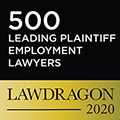Riverside Religious Discrimination Attorney

 As a concept, religious freedom is firmly etched in the legal and cultural foundations of the United States. However, moving from ideal to reality can be challenging, especially in a diverse society where people practice a wide range of different religions or opt to forgo religious beliefs altogether. Forbidding religious discrimination in the workplace is one way that the law works to protect the religious freedom of Americans. Do you believe that you’ve been discriminated against because of your spiritual beliefs? A skilled Riverside religious discrimination lawyer can help you stand up for your rights and fight back effectively.
As a concept, religious freedom is firmly etched in the legal and cultural foundations of the United States. However, moving from ideal to reality can be challenging, especially in a diverse society where people practice a wide range of different religions or opt to forgo religious beliefs altogether. Forbidding religious discrimination in the workplace is one way that the law works to protect the religious freedom of Americans. Do you believe that you’ve been discriminated against because of your spiritual beliefs? A skilled Riverside religious discrimination lawyer can help you stand up for your rights and fight back effectively.
Defining Religious Discrimination in the Workplace
If an employee or applicant is treated unfairly, harassed, or subjected to a hostile work environment because of their religious beliefs, that is religious discrimination. The specific nature of the spiritual beliefs held by the victim is irrelevant. The discriminatory behavior that they are subjected to is what matters in the eyes of the law.
The Law and Religious Discrimination in the Workplace
In the Golden State, Title VII of the Civil Rights Act of 1964, the California Fair Employment and Housing Act, and the California Workplace Religious Freedom Act of 2012 all offer employees protection from religious discrimination. As a result of these laws, it is illegal for employers to discriminate or take adverse employment action against an applicant or worker because of their religion, their religious attire, or their association with practitioners of a religion. In addition, employers have a legal responsibility to provide reasonable accommodations for an employee’s religious beliefs or practices when doing so doesn’t create an undue hardship for the business.
It is important to note that religion is broadly defined under these laws. For legal purposes, religion includes both traditionally recognized organized religions and sincerely held moral or ethical beliefs that occupy a place of importance in the life of the believer that is on par with a recognized faith. However, there are limits. Courts generally do not bestow religious protections on social or political belief structures.
Accommodations and Exemptions
Accommodation for an employee’s religious beliefs can take many forms. Flexible scheduling, voluntary schedule swaps, job reassignments, and changes to workplace policies and practices that make it easier for an employee to practice their religion are all options. However, no employer must provide accommodations that might cause undue hardship. Factors like the size of the business and the cost of accommodation are part of this calculation. The nature of the accommodation, the accommodation’s fairness to other employees, and whether there are reasonable alternatives to the proposed accommodation must also be weighed.
Certain organizations are granted a pass on the matter of religious discrimination. Some religious organizations are exempt from the laws governing this form of discrimination. For example, under Title VII, religious, educational institutions, corporations, associations, and societies may hire only individuals of a specific religion.
Identifying Religious Discrimination in the Workplace
What does religious discrimination in the workplace look like? There are three common forms of religious discrimination:
- Basing employment decisions on religion. An employer cannot refuse to recruit, hire, or promote someone because of their religious beliefs. Demotions, pay cuts, sanctioning, segregation, and termination motivated by religion are also unlawful.
- Allowing harassment. Persistent, unchecked teasing or mockery of religion can create a hostile work environment. Attempts to convert uninterested employees or coworkers can also be a form of harassment.
- Failing to provide a reasonable accommodation absent undue hardship. The law requires companies to provide reasonable accommodations for a worker’s religious beliefs. If a change in workplace policy would allow a worker to conform with their religious beliefs without negatively impacting productivity, safety, or efficiency, and the change does not infringe on the rights of other employees or create an undue hardship, the accommodation or a reasonable alternative should be offered.
Preventing Religious Discrimination in the Workplace
Employers can take practical steps to prevent religious discrimination:
- Establish written, objective criteria and policies and apply them consistently.
- Create, publicize, and enforce an anti-harassment policy that includes religious discrimination.
- Develop internal policies for handling requests for religious accommodations.
- Train managers and supervisors. Raise awareness of their responsibilities in recognizing, preventing, and addressing workplace discrimination.
Liability and Religious Discrimination
Private employers, educational institutions, and state and local governments can be held liable if they engage in or fail to respond adequately to religious discrimination. However, religious organizations are sometimes deemed exempt from these legal requirements.
Religious Discrimination and Employee Rights
The laws regarding religious discrimination in the workplace protect employees of traditional, organized religions, those with no religion, and those with sincerely held ethical or moral beliefs.
The specific law that applies can depend on the employer’s size and nature, and the requirements and deadlines for filing a claim vary. If you believe that you’ve been a victim of religious discrimination in your workplace, reaching out to an experienced religious discrimination lawyer is often the best way to protect your rights.
Hiring a Religious Discrimination Attorney
Discrimination can be tough to document and prove, but a skilled religious discrimination attorney can offer expert guidance. After reviewing your situation, they can help you identify ways to build a strong case and inform you about your best options for moving forward. This includes determining the appropriate law and the requirements and deadlines that you must meet when filing a claim. They can also advise you about matters of compensation and represent you in a lawsuit if your case goes to court.
As a statewide law firm with significant expertise in employment law, Rizio Lipinsky Heiting is committed to serving the people of California. With offices conveniently located in Riverside, San Francisco, San Bernardino, and Orange County, we make it easy to connect with us. If you’re convinced that you’ve been a target of religious discrimination in the workplace, we can help. Contact us today to schedule a free, confidential consultation.
- This article should only be used for informational purposes. It does not constitute legal advice, and it does not create an attorney-client relationship with anyone. If you need legal advice, please consult an attorney in your community.
Rizio Lipinsky Heiting - Riverside

Rizio Lipinsky Heiting - Riverside




















